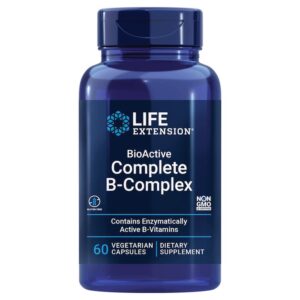Are You Getting Enough Vitamin B12?
Vitamin B12, an essential vitamin found in meat, is produced in the guts of animals. It’s the only vitamin that contains the trace element cobalt, giving it its formal name cobalamin. Vitamin B12 is also the only vitamin we can’t obtain from plants or sunlight. Plants don’t need B12, so they don’t make it or store it.
Vitamin B12 is also a water-soluble vitamin, which means your body can’t store it and you need to consume it regularly. Meat, fish, eggs, dairy, B12-fortified foods, and supplements serve as the only sources of B12. Most cereals and breads are fortified with B12, but if you avoid grains, like you should, you’ll have to depend on meat or supplements for your B12.
Vitamin B12 is essential for the formation and function of red blood cells and nerve cells. It also combines with folate (vitamin B9) to help make DNA. If you don’t consume enough B12, you could become anemic (which would make you weak and tired), experience neurological issues, or even develop cognitive issues like brain fog, dementia or even Alzheimer’s.

Researchers estimate that 40% of people over 60 have a B12 deficiency, which leads to cognitive decline, memory loss and even Alzheimer’s and dementia.
Symptoms of B12 deficiency include:
- Weakness, tiredness, or lightheadedness
- Unwanted weight loss
- Nerve problems like numbness or tingling
- Anxiety and depression
- Dementia/Alzheimer’s-like symptoms
- Learning or developmental disorder in kids
Most people who eat meat two or three times a day and liver occasionally shouldn’t have to worry about vitamin B12 deficiency. But if you experience any of the symptoms listed above, your digestive system may not be absorbing the B12 you eat very well.
In the 1950s, doctors discovered the concept of low B12 absorption when they worked with patients with pernicious anemia, an autoimmune condition where the body destroys intrinsic factor, a protein necessary to absorb B12. Scientist figured out that they could treat this form of anemia by feeding patients raw liver, which contains high amounts of B12.
People at greater risk for vitamin B12 deficiency include:
- Vegetarians and vegans
- People over 60
- People who use antacids a lot
- People on diabetes drugs like metformin
- People with Crohn’s disease, ulcerative colitis, celiac or IBS
- Women with a history of infertility
Whether or not you fit into any category on this list, if you have any of the symptoms of B12 deficiency, you should consider having your B12 levels checked. Diagnosis and treatment of B12 deficiency is relatively easy and cheap—especially when compared with treatment of the diseases B12 deficiency can cause.
Doctors often miss B12 deficiencies for two reasons. First, most physicians don’t routinely test for it. Second, the low end of the accepted range is too low. Many people who have so-called “normal” levels of B12 actually have a deficiency.
In the US, the acceptable range for serum B12 is between 200 and 900 picograms/mL. In Japan and Europe, the lower limit level for B12 is between 500 and 550 pg/mL. Doctors associate low levels of B12 with psychological and behavioral symptoms, such as cognitive decline, dementia, and memory loss. Some experts speculate the acceptance of the higher low-level threshold in Japan explains their low rates of Alzheimer’s and dementia.
 Experts who specialize in the diagnosis and treatment of B12 deficiency, like Sally Pacholok, R.N, and Jeffrey Stuart, D.O., suggest B12 supplementation for all patients who exhibit symptoms and have B12 levels less than 450 pg/mL. Look at it this way—you don’t want your B12 levels in the low range for a vitamin that plays such an essential role in your health. You want those levels at least in the middle, or ideally the top.
Experts who specialize in the diagnosis and treatment of B12 deficiency, like Sally Pacholok, R.N, and Jeffrey Stuart, D.O., suggest B12 supplementation for all patients who exhibit symptoms and have B12 levels less than 450 pg/mL. Look at it this way—you don’t want your B12 levels in the low range for a vitamin that plays such an essential role in your health. You want those levels at least in the middle, or ideally the top.
If you have some of the symptoms of B12 deficiency, get your serum levels tested. If you’re on the lower end of the spectrum, consider a B Complex vitamin. Most adults need about 2.4 mcg of B12 per day. The average diet with plenty of meat provides 5 mcg to 15 mcg per day. Most B Complex vitamins provide 500 mcg to 1000 mcg per day. Supplements contain such a high amount of vitamin B12 because B12-deficient patients need plenty of B12 to absorb.
It’s entirely possible that some of the symptoms we attribute to “normal” aging—such as memory loss, cognitive decline, and decreased mobility—at least partially result from a B12 deficiency. The next time you “have a senior moment,” remember: it might not be “just aging.” It could be B12 deficiency.
Stay Strong,
Bo Railey

